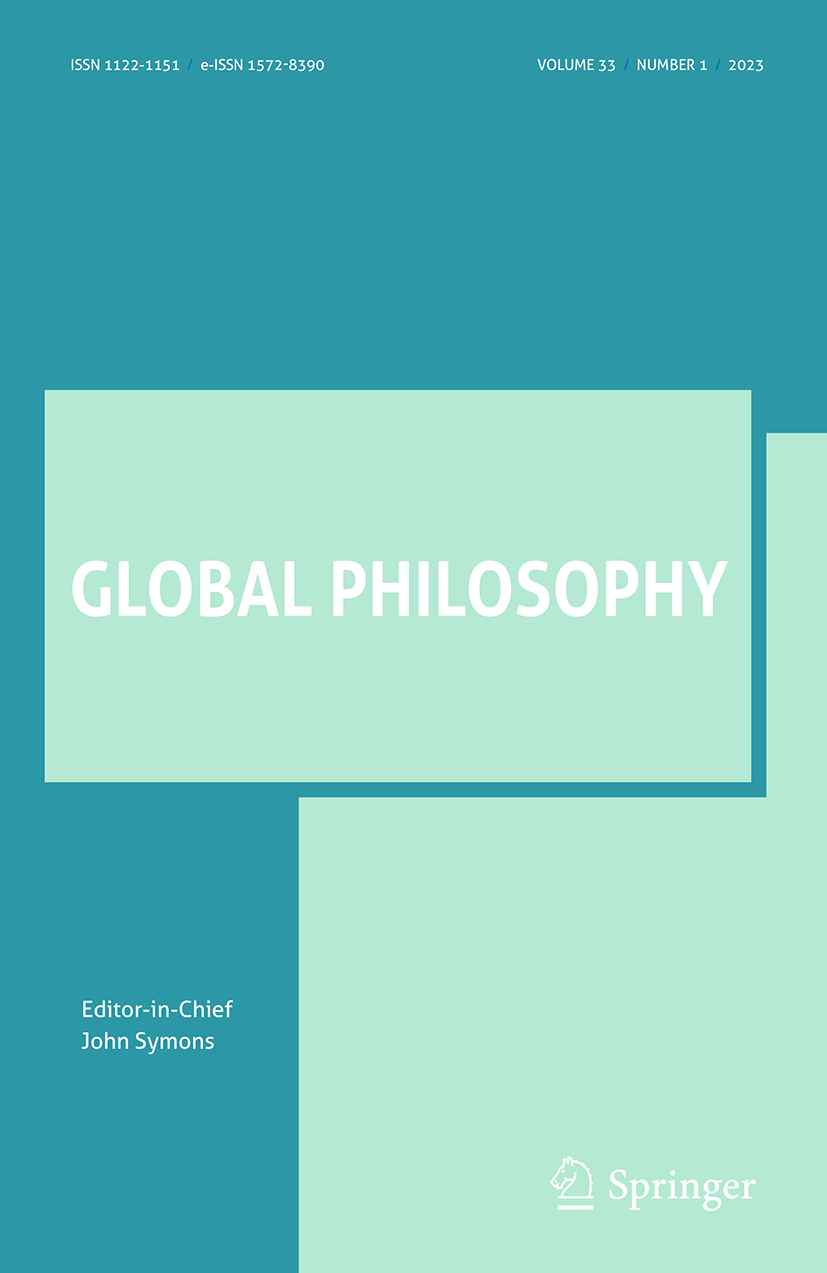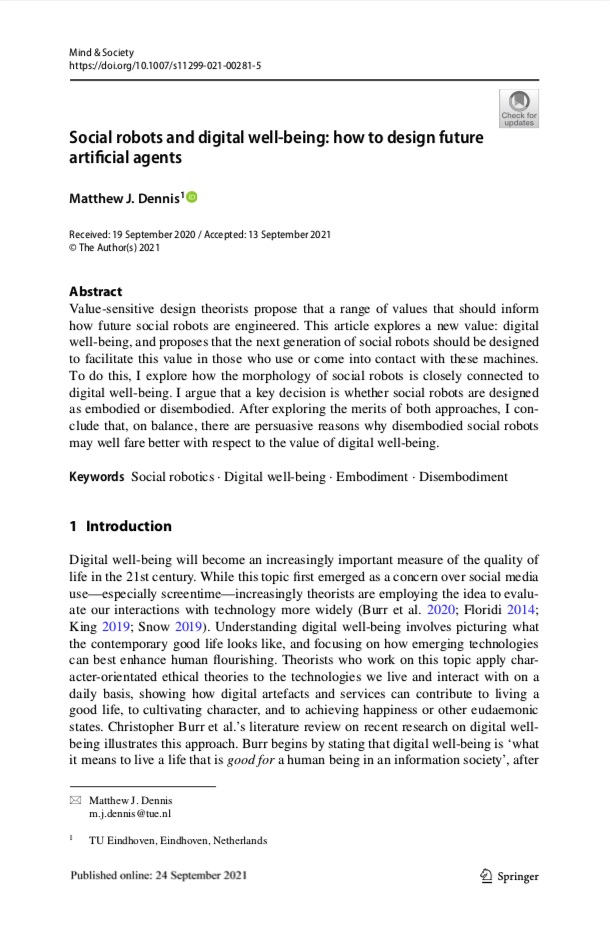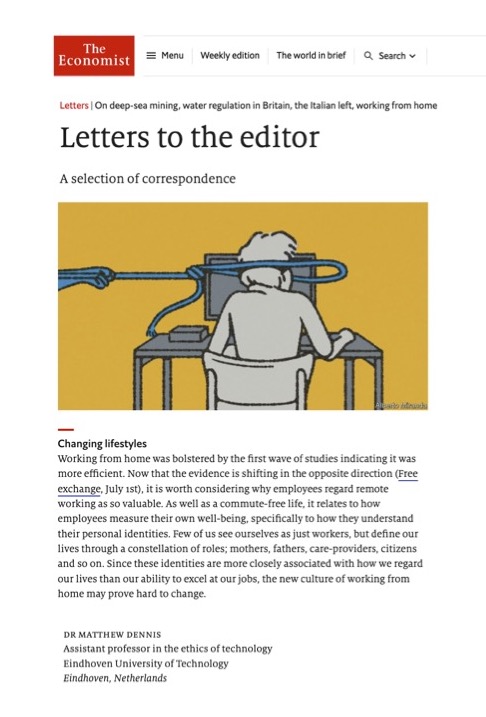Books and Edited Volumes

This open access volume explores how value sensitive design (VSD), responsible innovation, and comprehensive engineering can guide the rapid development of technological responses to the COVID-19 crisis. Responding to the ethical challenges of data-driven technologies and other tools requires thinking about values in the context of a pandemic as well as in a post-COVID world. Instilling values must be prioritized from the beginning, not only in the emergency response to the pandemic, but in how to proceed with new societal precedents materializing, new norms of health surveillance, and new public health requirements. The contributors with expertise in VSD bridge the gap between ethical acceptability and social acceptance. By addressing ethical acceptability and societal acceptance together, VSD guides COVID-technologies in a way that strengthens their ability to fight the virus, and outlines pathways to resolve today's moral dilemmas.
Peer-Reviewed Articles

The “attention economy” refers to the tech industry’s business model that treats human attention as a commodifiable resource. The libertarian critique of this model, dominant within tech and philosophical communities, claims that the persuasive technologies of the attention economy infringe on the individual user’s autonomy and therefore the proposed solutions focus on safeguarding personal freedom through expanding individual control. While this push back is important, current societal debates on the ethics of persuasive technologies are informed by a particular understanding of attention, rarely posited explicitly yet assumed as the default. We step away from a negative analysis in terms of external distractions and aim for positive answers, turning to Buddhist ethics to formulate a critique of persuasive technology from a genuinely ethical perspective. We offer input for further philosophical inquiry on attention as practice and attention ecology. We put forward comfort/effort and individualism/collectivism as two remaining central tensions in need of further research.
.jpeg)
The impact of social-media technologies (SMTs) on digital well-being has become an increasingly important puzzle for ethicists of technology. In this article, we explain why individualised theories of digital well-being (DWB) can only solve part of this puzzle. While an individualised conception of DWB is useful for understanding online self-regulation, we contend that we must seek greater understanding of how SMTs connect us. To build an account of this, we seek the conceptual resources for our account in Confucian ethics. In contrast to individualised conceptions of human flourishing that are found in the Western tradition, Confucian thinkers emphasise that individuals cannot flourish alone, but need wider social structures (partner, family, society, nation). Not only do strands of Confucian ethics explain how individuals are defined by the roles they take up in relationships, but it also makes practical suggestions for how these roles can be judiciously cultivated. We conclude our essay by identifying the Confucian notions that seem to have most promise for the design of future SMTs.

Value-sensitive design theorists propose that a range of values that should inform how future social robots are designed. This article explores a new value: digital well-being, and proposes that the next generation of social robots should be designed to facilitate this value in those who use these machines. To do this, I explore how the morphology of social robots is connected to digital well-being. I argue that we need to decide whether tomorrow's social robots should be designed as embodied or disembodied. After exploring the merits of both approaches, I explore why there may be persuasive reasons why disembodied social robots could be better aligned with the value of digital well-being.
.png)
Living well in the 21st century will present human beings with a unique set of demands and ethical challenges, many of which will require a rapid response to developments in the online space. Online activities increasingly permeate our practical lives. Although there is every indication that this activity will intensify, even experts on digital technology recognise that the precise effects of future emergent technology will be uncertain and remain unknown. We argue that character-based ethical approaches provides our best chance of creating a moral vocabulary that can guide us towards living well in the 21st century. The aim of this article is to offer the first outline of an educational model, founded on neo-Aristotelian theory, that illustrates how these qualities could be cultivated through moral education.
 copy.jpg)
Enthusiasm for self-care apps has tracked recent ethical interest in self-cultivation, especially for our moral development. While self-cultivation is a relatively new topic in analytic moral philosophy, continental ethicists have been interested in it far longer. These ethicists view the notion of self-cultivation as having much value for the challenges of contemporary practical life, although precisely how they envisage this has (so far) confounded commentators. This article charts the recent rise in self-care app technology, focusing on apps that claim to shape our ethical development and our passionate characters. To do this, I examine the ethical issues that arise from self-care app companies using emerging technologies to cultivate our passionate attachments. Understanding these issues, I argue, can help us design self-care apps in better ways.
Book Chapters
 copy.jpeg)
Increasing digital well-being is increasingly viewed as a key challenge for the tech industry, largely driven by the complaints of online users. Recently, the demands of NGOs and policy makers have further motivated major tech companies to devote practical attention to this topic. While initially their response has been to focus on limiting screentime, self-care app makers have long pursued an alternative agenda, one that assumes that certain kinds of screentime can have a role to play in actively improving our digital lives. This chapter examines whether there is a tension in the very idea of spending more time online to improve our digital well-being. First, I break down what I suggest can be usefully viewed as the character-based techniques that self-care apps currently employ to cultivate digital well-being. Second, I examine the new and pressing ethical issues that these techniques raise. Finally, I suggest that the current emphasis on reducing screentime to safeguard digital well-being could be supplemented by employing techniques from the self-care app industry.
Opinion Articles

Working from home was bolstered by the first wave of studies indicating it was more efficient. Now that the evidence is shifting in the opposite direction (Free exchange, July 1st 2023), it is worth considering why employees regard remote working as so valuable. As well as a commute-free life, it relates to how employees measure their own well-being, specifically to how they understand their personal identities. Few of us see ourselves as just workers, but define our lives through a constellation of roles; mothers, fathers, care-providers, citizens and so on. Since these identities are more closely associated with how we regard our lives than our ability to excel at our jobs, the new culture of working from home may prove hard to change.
.png)
Over the last decade, techniques of self-directed character change have undergone a revolution, one that promises to fundamentally rewrite the way we understand the cultivation of character. This revolution has been supercharged by rapid advances in digital technology, as well as increasing public attention regarding the benefits of tracking, monitoring, documenting, and shaping the self. Part of the difficulty in following the march of this zeitgeist is that it is so ubiquitous and diffuse. It infuses our perceptions and values of healthcare, education, business, leisure, in addition to fuelling our seemingly insatiable appetite for the ‘self-care’ industry. The idea that our characters can – indeed should – be actively cultivated is now so integral to the 21st century experience that it would be hard to understand a host of contemporary human practices without this assumption. In this paper, I explore how technology can help us change or improve who we are through digital regimens of self-cultivation.